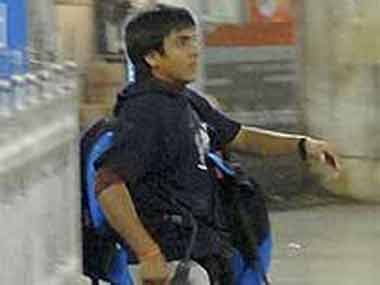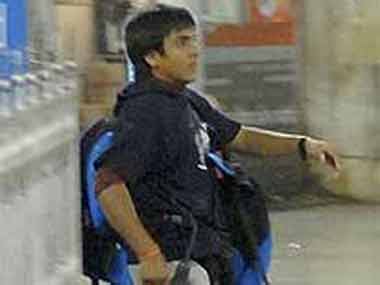Being a defence lawyer isn’t easy and being one for someone who is accused of terrorist strikes is the hardest, especially when public opinion is completely against you. Mohammed Ajmal Kasab has been a particuarly difficult case given he was a terror suspect with overwhelming evidence against him. It also didn’t help that everyone wanted to see him hanged. Kasab has had a series of lawyers defending him. Anjali Waghmare from the state legal aid cell was the first one but quickly faded away after it was revealed that she was representing a victim of the terror strikes in another case. [caption id=“attachment_434709” align=“alignleft” width=“380”]
 Kasab during the 2008 terror strikes.Screen grab from CNN IBN[/caption] But before being removed from the trial, she faced the wrath of political activists with Shiv Sena activists protesting outside her Worli residence in 2009. The court then appointed Abbas Kazmi, who had earlier defended persons accused in the 1993 serial blasts case, as the lawyer for the gunman. State legal aid lawyer KP Pawar was retained to assist in the defence. However, soon after being appointed Kazmi was given high security following a high threat perception and statements by the political parties that any lawyer who defended the Pakistani national could face repercussions. “You all know what a hostile atmosphere I had faced from all quarters and communities when I was appointed for the trial,”
Kazmi said
in an interview in 2009. Even after he was removed from the trial, Kasab convicted and the appeal sent to the high court, lawyers who were appointed to defend him were at the receiving end of threats again. “Many lawyers have asked me to leave the case but I didn’t because I saw Kasab as just another client,” Shah, was quoted as saying in a
Telegraph report
. And Shah like Kazmi had represented accused in the 1993 serial blasts case. It has never been easy for lawyers defending terror suspects. Advocate Shahid Azmi is perhaps the worst case of what can happen when you’re a defence lawyer defending those few others want to. Detained under the draconian TADA, Azmi spent some of his teenage years in a jail on terrorism charges, and later studied law and while practising in Mumbai chose to represent those accused in terror cases. Azmi was shot by gunmen in his office in suburban Mumbai soon after his client, Faheem Ansari, was acquitted by the court which was conducting the trial in the 26/11 terror strikes. Police claim he was killed by gunmen sent by a gangster as punishment for representing terror accused. At the end of the day, what the rabble rousers often miss is that under Indian law every accused is entitled to a defence, no matter the gravity of the crime. Failing to provide adequate defence to accused, no matter how heinous a crime they may be accused of, reflects worse on us.
Kasab during the 2008 terror strikes.Screen grab from CNN IBN[/caption] But before being removed from the trial, she faced the wrath of political activists with Shiv Sena activists protesting outside her Worli residence in 2009. The court then appointed Abbas Kazmi, who had earlier defended persons accused in the 1993 serial blasts case, as the lawyer for the gunman. State legal aid lawyer KP Pawar was retained to assist in the defence. However, soon after being appointed Kazmi was given high security following a high threat perception and statements by the political parties that any lawyer who defended the Pakistani national could face repercussions. “You all know what a hostile atmosphere I had faced from all quarters and communities when I was appointed for the trial,”
Kazmi said
in an interview in 2009. Even after he was removed from the trial, Kasab convicted and the appeal sent to the high court, lawyers who were appointed to defend him were at the receiving end of threats again. “Many lawyers have asked me to leave the case but I didn’t because I saw Kasab as just another client,” Shah, was quoted as saying in a
Telegraph report
. And Shah like Kazmi had represented accused in the 1993 serial blasts case. It has never been easy for lawyers defending terror suspects. Advocate Shahid Azmi is perhaps the worst case of what can happen when you’re a defence lawyer defending those few others want to. Detained under the draconian TADA, Azmi spent some of his teenage years in a jail on terrorism charges, and later studied law and while practising in Mumbai chose to represent those accused in terror cases. Azmi was shot by gunmen in his office in suburban Mumbai soon after his client, Faheem Ansari, was acquitted by the court which was conducting the trial in the 26/11 terror strikes. Police claim he was killed by gunmen sent by a gangster as punishment for representing terror accused. At the end of the day, what the rabble rousers often miss is that under Indian law every accused is entitled to a defence, no matter the gravity of the crime. Failing to provide adequate defence to accused, no matter how heinous a crime they may be accused of, reflects worse on us.
Why it hasn't been easy being a defence lawyer for Kasab
FP Staff
• August 29, 2012, 11:40:13 IST
It has never been easy to defend persons accused of terrorism, especially when there are political elements threatening lawyers. But it doesn’t reduce the importance of allowing all accused a fair defence.
Advertisement
)
End of Article